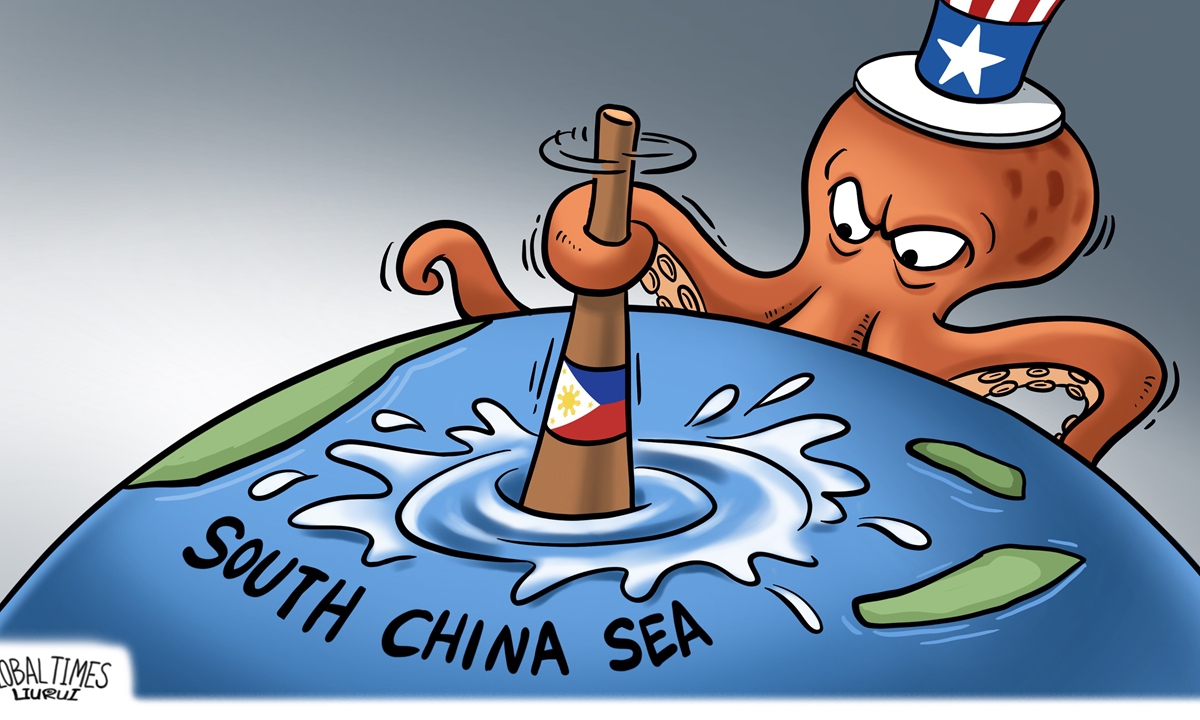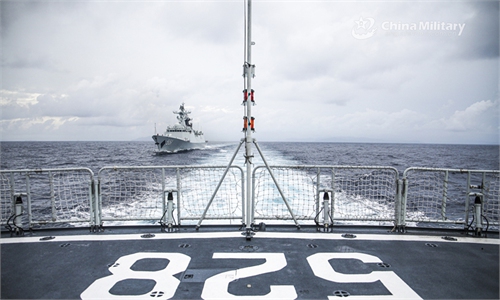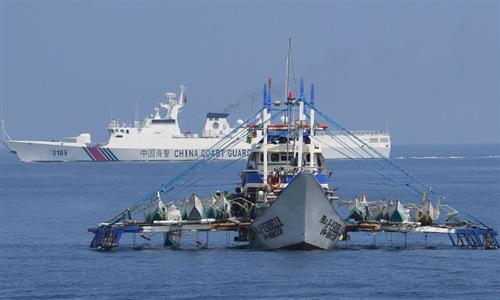
US in South China Sea Illustration:Liu Rui/GT
Tides have been high in the South China Sea lately. In the past few days, the waters have witnessed US-Philippines, Australia-Philippines joint patrols, and a US warship that illegally trespassed into China's territorial waters off the Xisha Islands. Those actions are typical moves to fan further tension and risks in an already volatile situation.
Starting on November 21, the US and the Philippines carried out three-day joint maritime and aerial patrols in waters near Taiwan island, and some South China Sea islands, marking the first bilateral patrols since they were halted in 2016. It signifies US' manipulation of the Philippines and involvement in South China Sea affairs have returned to a high level, observers note. Since Australia has traditionally relied on the US in the security domain, it is not surprising that the Philippines and Australia have conducted their first joint sea and air patrols in the South China Sea a few days afterward, from November 25 to 27.
Be it direct launching joint patrols with the Philippines in the South China Sea, illegally entering into China's territorial waters, or involving itself in regional affairs through Australia's participation, the US has a primary objective - to boost the confidence of the Philippines and ensure that Manila will continue to maintain a sustained confrontational, even provocative stance, toward China. This is because the US needs to maintain a heightened level of tension in the region to serve its regional strategy, Li Kaisheng, vice president of Shanghai Institutes for International Studies, told the Global Times.
Since Philippine President Ferdinand Romualdez Marcos Jr came to power, the country has been rapidly boosting its partnership with the US, resulting in an increased US military presence on its territory. Earlier this year, Manila granted Washington access to four new military bases under a joint defense pact, with the locations of these sites facing Taiwan island, and the disputed South China Sea islands. These series of moves have significantly deviated from the common balancing strategy among ASEAN countries, including the Philippines' previous strategy.
Marcos Jr once emphasized "the Philippines shall continue to be a friend to all, and an enemy of none," but obviously this understanding has failed to run through all government departments, especially the security and foreign affairs departments, Li said. He noted that the Philippine military has not only promoted US-Philippine military cooperation, but also pushed Marcos Jr's administration toward a pro-US direction.
Now, Manila is enlisting foreign forces to patrol the South China Sea, creating more tensions in its disputes with China so as to pile more pressure on the latter. And the US is glad to take advantage of this.
These US military moves in the South China Sea demonstrate that Washington lacks sincerity in maintaining stable ties with Beijing. At the diplomatic level, the US wishes to send a signal that it can stir up waves around China, while preventing it from losing its temper, Shen Yi, a professor at Fudan University, told the Global Times.
As long as the US wants to maintain its hegemonic status, the structural contradictions between China and the US will persist, US' strategy of containing China will remain unchanged, and thus the US will keep ganging up with allies and create troubles for China, Song Zhongping, a Chinese military expert and TV commentator, told the Global Times.
Against the backdrop, certain US forces should not be overlooked - those with vested interests, including arms dealers - they have played a role in manipulating foreign military conflicts and in interfering with US government's decision-making. Those forces, which hope for war and unrest, can lobby in the Congress and the administration, hyping up threat theories, influence US policies, and ultimately achieve their goal of stirring up trouble worldwide, according to Song.
Yet the South China Sea is not a place for external forces to practice hegemony or act arbitrarily. Those who illegally intrude into the South China Sea will be warned off or expelled. Chinese military's patrols and drills have also become regular in the waters. The situation in the South China Sea is complicated. But China's ability to defend its own rights and interests has greatly increased, which has become the source of China's strong strategic willpower and focus.
The latest development of China-US ties, including what happened in the South China Sea is an epitome of China-US game in the new era: If the US wants to talk, the door is open. Yet if the US seeks trouble, there will be countermeasures, Shen said.


